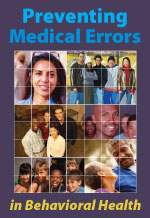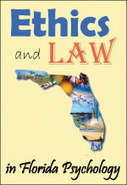Florida psychologists have an upcoming license renewal deadline of May 31, 2012.
Every licensee must complete 40 hours of approved continuing psychological education (CE) within the two year licensure period (biennium) including 2 hours on the prevention of medical errors, 3 hours on ethics and Florida laws, and 2 hours on domestic violence (every third renewal).
|
Professional Development Resources is approved by the American Psychological Association (APA) to sponsor continuing education for psychologists. Professional Development Resources maintains responsibility for all programs and content. Professional Development Resources is also approved by the Florida Board of Psychology and Office of School Psychology (CE Broker Provider #50-1635 – courses are automatically reported to CE Broker). Florida psychologists may earn all 40 required hours @ pdresources.org. |
|
Questions about CE Broker? Click here for answers to FAQs. |
 Preventing Medical Errors in Behavioral Health is intended to increase clinicians’ awareness of the types of errors that can occur within mental health practice, how such errors damage clients, and numerous ways they can be prevented. Its emphasis is on areas within mental health practice that carry the potential for “medical” errors. Examples include improper diagnosis, breach of confidentiality, failure to maintain accurate clinical records, failure to comply with mandatory abuse reporting laws, inadequate assessment of potential for violence, and the failure to detect medical conditions presenting as psychiatric disorders (or vice-versa). It includes detailed plans for error reduction and prevention like root cause analysis, habitual attention to patient safety, and ethical and legal guidelines. The course includes numerous cases illustrations to help demonstrate common and not-so-common behavioral health errors and specific practices that can help clinicians become proactive in preventing them. Course #20-10B | 2010 | 31 pages | 15 posttest questions
Preventing Medical Errors in Behavioral Health is intended to increase clinicians’ awareness of the types of errors that can occur within mental health practice, how such errors damage clients, and numerous ways they can be prevented. Its emphasis is on areas within mental health practice that carry the potential for “medical” errors. Examples include improper diagnosis, breach of confidentiality, failure to maintain accurate clinical records, failure to comply with mandatory abuse reporting laws, inadequate assessment of potential for violence, and the failure to detect medical conditions presenting as psychiatric disorders (or vice-versa). It includes detailed plans for error reduction and prevention like root cause analysis, habitual attention to patient safety, and ethical and legal guidelines. The course includes numerous cases illustrations to help demonstrate common and not-so-common behavioral health errors and specific practices that can help clinicians become proactive in preventing them. Course #20-10B | 2010 | 31 pages | 15 posttest questions Ethics & Law in Florida Psychology ensures that Florida-licensed psychologists are fully aware of the ethical and legal privileges and constraints under which they are licensed to practice in the State of Florida. It provides the opportunity for a comprehensive reading of the APA Code of Ethics and the three sets of statutes and rules governing the practice of psychology in Florida. Completing this course will fulfill the requirement that licensed psychologists in Florida complete each biennial renewal period three hours of continuing education on professional ethics and Florida Statutes and rules affecting the practice of psychology. Course #30-06 | 2012 | 40 pages | 21 posttest questions
Ethics & Law in Florida Psychology ensures that Florida-licensed psychologists are fully aware of the ethical and legal privileges and constraints under which they are licensed to practice in the State of Florida. It provides the opportunity for a comprehensive reading of the APA Code of Ethics and the three sets of statutes and rules governing the practice of psychology in Florida. Completing this course will fulfill the requirement that licensed psychologists in Florida complete each biennial renewal period three hours of continuing education on professional ethics and Florida Statutes and rules affecting the practice of psychology. Course #30-06 | 2012 | 40 pages | 21 posttest questions Domestic Violence: Child Abuse and Intimate Partner Violence is intended to help health professionals maintain a high state of vigilance and to be well prepared with immediate and appropriate responses when abuse is disclosed. There is a special section on the complexity of an abuse victim’s decision about if and when to leave an abuser. This course will teach clinicians to detect abuse when they see it, screen for the particulars, and respond with definitive assistance in safety planning, community referrals, and individualized treatment plans. Course #20-61 | 2012 | 31 pages | 18 posttest questions
Domestic Violence: Child Abuse and Intimate Partner Violence is intended to help health professionals maintain a high state of vigilance and to be well prepared with immediate and appropriate responses when abuse is disclosed. There is a special section on the complexity of an abuse victim’s decision about if and when to leave an abuser. This course will teach clinicians to detect abuse when they see it, screen for the particulars, and respond with definitive assistance in safety planning, community referrals, and individualized treatment plans. Course #20-61 | 2012 | 31 pages | 18 posttest questions
 The 2012 edition of the required course,
The 2012 edition of the required course, 










